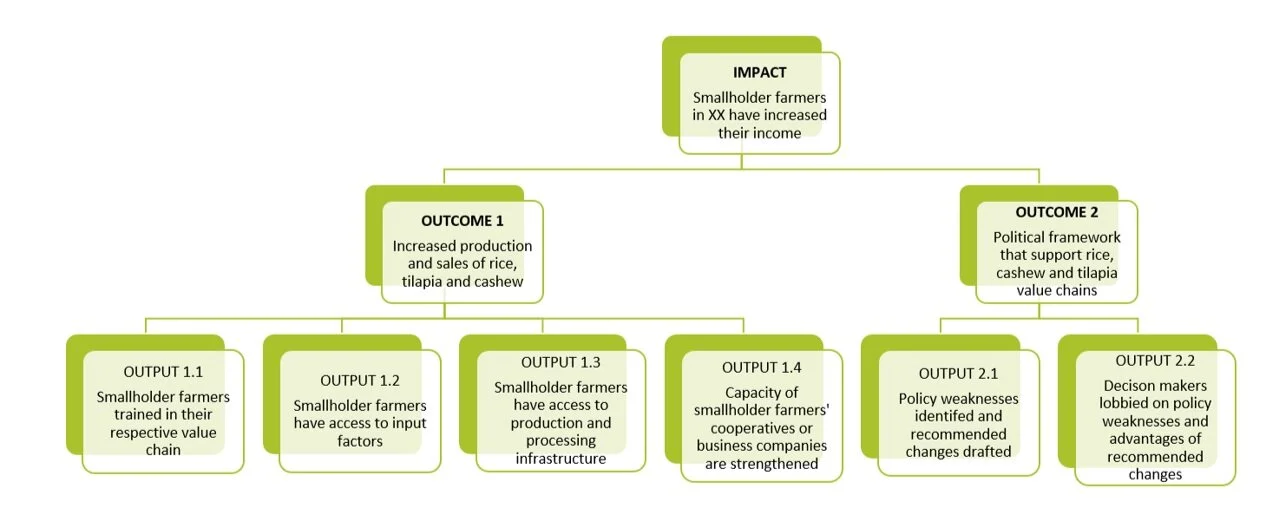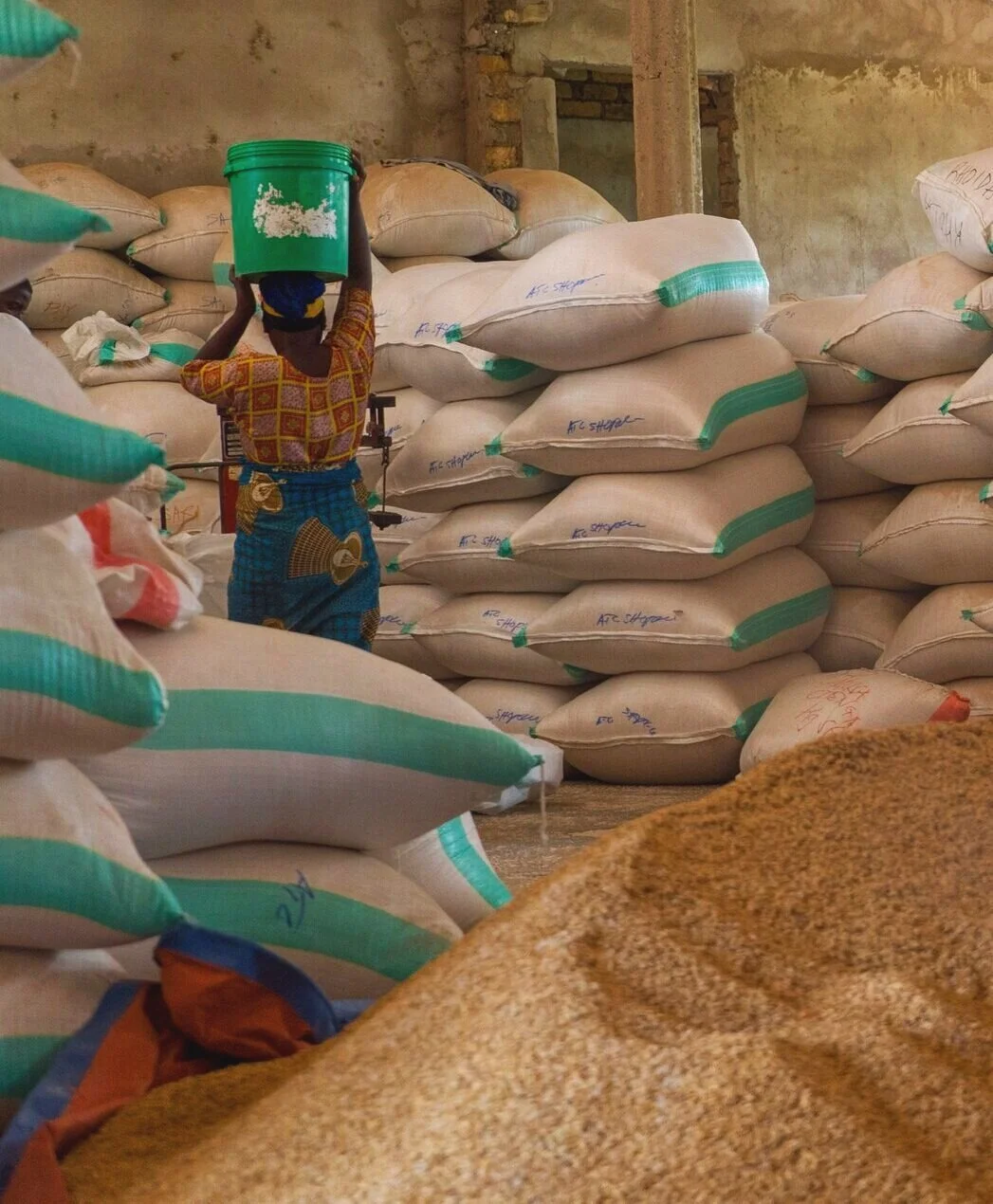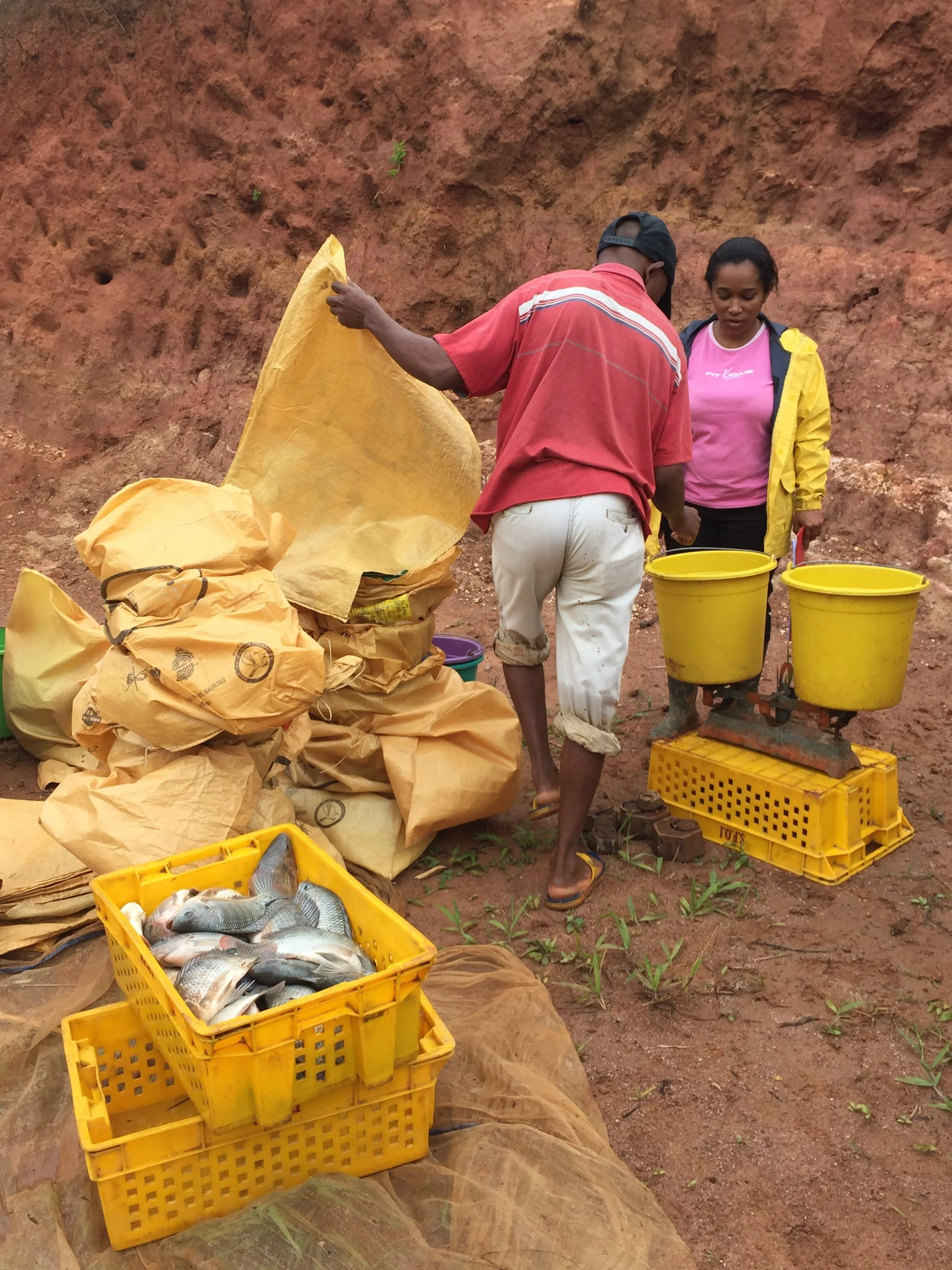Our Theory of Change
Norges Vel supports smallholders in Madagascar, Mozambique and Tanzania to shift from subsistence-oriented aqua- and agriculture to more commercialised and profitable ways of production and marketing.
This is done through supporting smallholders organisations to engage in a value chain approach. We believe this will be brought about by firstly, supporting smallholders to increase their production and sale of produce, and, secondly, through supporting farmer organizations to engage with decision makers to improve the framework conditions for smallholder farmers in the four partner countries.
The Theory of Change can be summarized in this figure showing the outline of the programme’s logical framework:
Situational analysis
Globally, the world will have to produce between 60 - 70% more food over the next 35 years. Since hundreds of millions of people will continue to live in poverty, food prices would have to be kept low in order to avoid hunger, unrest and political instability. These challenges are particularly pressing in Africa.
The continent is experiencing a crisis and an opportunity. Africa’s population stands at 1,2 billion people and over 60% are below the age of 25. Most African youths are not employed, and according to the World Economic Forum, by 2035, 350 million new jobs will be needed. Africa’s population is growing faster than jobs are created.
Parallel to increasing food production, change in climate does not make it any easier for farmers in the countries where we work
Norges Vel and our partners’ investments in food production and agribusiness aim to improve the competitiveness of domestic and local production, increase farmers profit and make food more affordable and accessible. Parallel to increasing food production, change in climate does not make it any easier for farmers in the countries where we work.
Rapid change in weather, change in season, tropical storms and extensive heat, to name a few, make farming even more challenging. Production of food must thus be been seen holistically through the whole value chain – from soil to market/ pond to table. A more systemic approach, considering production, climate change, market forces and farmer know-how must be prioritised. To add to this approach, our target groups must become even more climate resilient.
Furthermore, a quiet revolution in the private sector is driving the transformation of African agriculture and aquaculture. This is according to the Africa Agriculture Status Report 2019 (PDF 14MB), published by the Alliance for a Green Revolution in Africa (AGRA). A proliferation of small and medium-sized enterprises (SMEs) is contributing to a shift away from subsistence-oriented agriculture to one that is more commercialized, profitably productive, and smallholder and entrepreneur-led. Access to finance for smallholder farmers are still either very expensive or difficult to get hold of. Due to this, more emphasis should be on financial systems as well as an intensified effort to give entrepreneurs the understanding and tools to become successful in their start-ups.
Therefore, the key contextual factors Norges Vel seek to address with this programme are increased demand for food and employment due to strong population growth in partner countries, with the added constraints of climate change, and the potential for growth and transformation latent in the SME sector. These are issues that Norges Vel is uniquely positioned to address.
Key strategy elements – Value Chains and Producer Organizations
Our strategy builds on the key elements of value chains and producer organisations. Poor rural producers and their products are connected to markets with larger aqua/agricultural value chains.
Every product that is traded – locally, nationally or internationally ‒ is part of a value chain. And every link of the chain has the potential to add value to the product.
Norges Vel believes that strong links to markets for rural farmers and producers is an important tool to increasing aqua-/agricultural production, generating economic growth in rural areas and reducing hunger and poverty. Improving market links creates a positive circle by boosting productivity and quality, increasing incomes and strengthening food security.
Better access by small producers to domestic, regional or international markets means that they can steadily sell more products at potentially higher prices. Similarly, they get better access to inputs, at better prices, thus increasing their margins. This in turn encourages farmers to invest in their own businesses and increase the quantity, quality and diversity of the goods they produce. It creates motivation to continue with what they are doing, sustaining their jobs and thus also food production.
Producer organizations provide an economical- and financial infrastructure to members and organize transactions with buyers. Collective action by organized farmers reduces transaction costs in markets, mitigates risks and builds up market power. Norges Vel has worked with cooperative development and other membership-based organizations for decades, if not centuries. Norges Vel’s international partnerships mainly focus on promoting entrepreneurship and strengthening the capacity of various producer organizations.
Warehose for some of our rice cooperatives in Tanzania.
A key role of producer organizations is linking small scale entrepreneurial producers with agribusiness partners in the value chain. In addition, many organizations are offering their members a variety of services such as access to natural resources, information, digital solutions, as well as implements and training. They also facilitate their participation in decision making processes.
A powerful contribution of cooperatives and producer organizations is their ability to help small producers voice their concerns and interests – and ultimately increase their negotiating power and influence policy-making processes.
“Multi-stakeholder platforms” and consultative fora are examples of where small producers discuss the design and implementation of public policies. Hence, a cooperative is a democratically controlled structure where generating profit is only part of the story. Ultimately, it’s a social enterprise that promotes democracy and contributes effectively to strengthen the civil society.
Women are increasingly being recognised for the important contributions they make to food production and are becoming ever more involved in all facets of the agricultural and aquacultural value chains. In all our interventions we seek to address gender imbalances, by encouraging equal involvement of men and women in formal business operations, from production to decision-making and holding of leading positions. This often requires particular focus on empowerment and capacity building of women.
Increasing production
Norges Vel works with producer organizations to build systems and capacities to support training in modern production methods, common investments, action for market access for both inputs and sales of produce, and to enable collective action.
The memberships in the organizations provide smallholders with valuable entry points to the various links in the market chain:
Training gives the smallholders an understanding of modern production methods, and how to engage in the market.
The collectives provide access to input factors and helps achieve economies of scale in gaining access to input factors, both logistically and in terms of pricing.
Smallholders get access to production and processing infrastructure through the collectives, such as warehouses, mills and ponds, which help them reduce losses and meet the requirements of the market.
These interventions will directly contribute to a shift in production methods and market engagement that will lead to a measurable increase in production.
Local farmers produce ground nuts between the cashew trees in Mozambique.
Improving framework conditions
Norges Vel will work with the producer organisations to engage with decision makers to address weaknesses and opportunities in the smallholders’ policy framework conditions.
Local farmers in Madagascar earns a better living when becoming fishfarmers.
Smallholders have historically suffered from poor framework conditions, often caused by a combination of market manipulation by bigger and better-connected actors and poor protection from rent-seeking by regulatory authorities at local and central level. This important political work will be done by:
Working with organisations to identify weaknesses and draft concrete proposals for how to address them.
Engage with decision makers to educate them on the issues faced by smallholders and lobbying for adoption and implementation of strategic policy reform.
Through these interventions Norges Vel will build and support the producer organisations capacities to engage at political level to empower smallholder producers.
Importantly, our strategy is to enhance the sustainability and resilience of production systems by promoting climate smart agriculture (CSA) and innovations in food-production. The purpose of our efforts to promote farmer entrepreneurship is to contribute to the “triple win” of improving food security, addressing climate change and increasing the incomes of rural populations who today live in poverty.
Increasing the income of smallholder producers
Through the two outcomes described above, increasing production and sales and improving framework conditions, smallholders will be in a position to increase production and improve prices of both sales and inputs. Together this will lead to a sustained increase in their income and well-being.
This is achieved by working through and with their producer organizations, which means that they have been empowered to continue this work and to have strong ownership of the programme and the result.
The figure below presents our Theory of Change in a way which is aimed to provide a graphical understanding of where we work, what we do and what we achieve.






